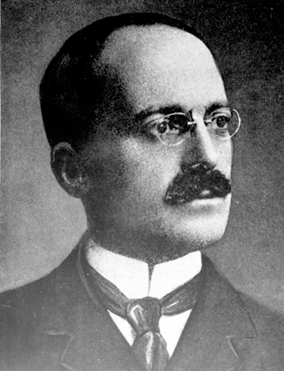Omnibus per artem fidemque prodesse, or "to all with skill and fidelity." The words emblazoned on the seal of the American College of Surgeons (ACS) serve to embody one of its founding members, Dr. Charles Scudder. Charles was a consummate American: a prolific surgeon scientist, a dedicated father and mentor, and a bold, pioneering leader. Without question, he was a great man who helped to shape the foundation of American surgical care. Members of the college as well as society at large, owe a heavy debt.
Born in 1860, Charles Locke Scudder was raised in a small, idyllic Massachusetts town. His father was the pastor of the local Congregational Church. Charles would receive the benefit of a strong liberal education, excelling in multiple areas. During his undergraduate studies at Yale, Scudder earned two degrees before entering Harvard Medical School in 1883. There, he embraced a wide breadth of surgical interests, from urologic to orthopedic to gastrointestinal surgery.
Clinically, Scudder developed into a gifted, industrious general surgeon. His practice was so popular and successful that he was able to pay all of his educational debts, within 3 years of his graduation from medical school. Other surgeons regarded him as meticulous, earnest, able, and energetic. Always, he was described as busy.
Charles Scudder would go on to become a prolific writer and enjoy a long and storied academic career. His publication in 1887, on the management of clubfoot in children, was the first of over 150 peer reviewed manuscripts in the fields of oral tumors, orthopedic injuries, pediatric, and gastrointestinal surgery. His operative management of pyloric stenosis was considered the standard of care in the early 1900s, until he recognized the superiority of Ladd’s pyloromyotomy in 1915. In spite of these successes, Scudder became best known for his masterwork, The Treatment of Fractures. Featuring over 11 editions published over almost a 40-year span, the text contained detailed information regarding the treatment of fractures of the face, spine, chest wall, pelvis, and extremities.
As a national surgical leader, Scudder was a founding member of the ACS, the New England Surgical Society, and the Boston Surgical Society, for which he also served as the initial vice president. In these roles, Scudder had significant influence in drawing national attention to an issue he considered gravely neglected, the heterogeneous, and often subpar management of fractures. He organized a meeting at Massachusetts General Hospital in 1922, to standardize fracture care in the United States and Canada. Based on his example, the ACS founded the Committee on Treatment of Fractures. Scudder served as the initial chair, until he stepped down from his role in 1933. His work would help revolutionize and prioritize the care of the injured patient in the United States and his committee would continue to grow in significance, evolving to what is now known as the American College of Surgeons Committee on Trauma.
During his time as chairman, he pushed for the foundation of regional committees and delivered multiple presentations on the state of fractures and trauma. One presentation delivered to the ACS titled, “Oration on Fractures,” was so influential as to require an annual event at the College Convention. Started in 1929, the Oration on Fractures, now known as the Scudder Oration, has been delivered by honored speakers for almost 100 years.
Charles Scudder was a master surgeon that improved the outcomes of patients on a personal, regional, national, and global level. His persistent and thoughtful dedication should be an inspiration to surgeons everywhere looking to make a difference patients’ lives and the global community.


